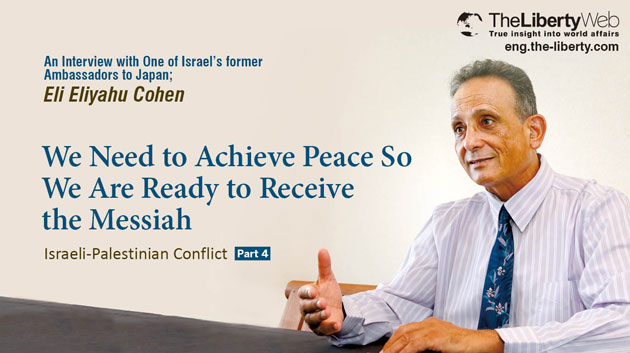We Need to Achieve Peace So We Are Ready to Receive the Messiah
An Interview with One of Israel's former Ambassadors to Japan; Eli Eliyahu Cohen
We asked former Israeli Ambassador to Japan, and author of many books detailing the relationship between Jews and Japan, about the Israeli-Palestinian conflict.
Interviewer: Hanako Cho
Liberty staff asked a former Israeli Ambassador to Japan, who has authored several books on the relationship between Judaism and Japan, Eli-Eliyahu Cohen, what his views on the Israeli-Palestinian conflict were.

Eli’s mother gave birth to him in Jerusalem in 1949. He studied physics and mathematics at Hebrew University in Jerusalem, and Eli received his MBA from Thames Valley University in London. He was a former deputy Mayor of Ma’ale Adumim City and a former advisor to the Minister of Defense. Eli has served as the head of several high tech companies. He was a member of the Knesset for the Likud party between 2002 and 2003. From 2004 to 2007, Eli served as the Israeli Ambassador to Japan. He is President Emeritus of the Israel Shotokan karate organization, and Eli holds a 5th degree black belt in karate and the rank of 5th Dan in IaiDo [Japanese Swords].
What are your views on the Israeli-Palestinian peace process?
I’m optimistic about achieving peace. In 1948, when Israel was created, 22 Arab nations were its enemies, 7 of them sent their militaries into Israel. Later that number became 5, then 2 nations, and it finally became only Palestine. Now, it’s just Hamas, which is a terrorist group inside of Palestine.
We have had formal peace relations with Egypt and Jordan. Other Arab nations have also become partners seeking peace, which does not take into consideration Iran, because it doesn’t have any border with Israel, and they are not Arabs, but Persians. It also does not taking into consideration the new terrorist Islamic nation that’s fighting inside of Iraq and Syria, which became a problem of the entire world, including all of the Arab nations.
The Palestinians are very intelligent. They are more advanced than most of the Arabs in this part of the world. Since they live very close to us, and they work with us on a daily basis, they can appreciate and understand the benefits of democracy. Therefore, they will find their way to real democracy much faster than others in the region.
Conflicts seem endless, which are for various reasons, sometimes territorial, religious, national, and cultural.
I’ll explain why conflicts have surrounded Israel.
First, Israel and Lebanon have always been strategic lands. They have been connecting places between the 3 continents of Europe, Asia, and Africa. This point, which is a layer of the current conflict, has mixed with the others, and it has created a very complicated situation that has been very difficult to overcome.
Second, there have been religious reasons for the conflict. Israel has been a Jewish State with Muslim countries surrounding it. Jerusalem has been a sacred place for the Jewish people for more than 4,000 years. It was once the Jewish capital, and it has remained at the heart of the Jewish people.
To demand to split Jerusalem for a promise of peace is like to ask the Japanese to give up Kyoto for the North Koreans. The Holy Koran, the Book of the Islam, does not mention Jerusalem even one time, but the Muslims say that “the horse of Mohammed went to heaven from Jerusalem,” so they think the city is holy, too [only Mecca and Medina are holier (in Saudi Arabia) It seems that the conflict won’t end.
Nevertheless, the writers of the Koran positively mentioned the Jewish people in their book. There might be a chance to find a way to respect each other in the future.
The third reason has been nationalism. In the Middle East, there are 22 Arab Nations, and they haven’t been able to accept the nation of Israel. In Arab nations, people can find different kinds of Islam and also some other religious believers, such as Christians, Druze, Cherkessk, etc., but they still see them as Arabs. They’d prefer if Israel had a majority of Arabs, or there was just a Palestinian state, where Jews could live as they did in the past in Arab states before Israel was re-born in 1948. They’d really prefer to have 23 states in the Arab League, instead of 22 they have today.
They might think differently now that they’ve had to face the risk of the Islamic nation’s terrorist organization’s destruction of them.
The fourth reason was culture. Israel is a part of Western culture, which means that its people believe in freedom and democracy. This is a huge risk for the Middle East’s Islamic and Monarchic nations who are afraid of their people learning how to live freely, including the women who have limited rights in Muslim countries. It’ll endanger their way of life, which could also destroy their political and ruling systems.
What are your views on the Hamas?
Hamas is a terrorist organization that has declared they “will destroy Israel”. There is no way of talking to them logically. The only way to deal with them is to be strong and to make sure that they don’t become strong.
Hamas Filled the Power Vacuum Left When Israelis Withdrew from the Gaza Strip
In 2005, Israel made a big sacrifice when it destroyed its own cities and villages in Gaza and deported all of the Israeli people from Gaza against their wills, only to give the Gaza people a chance to live their own life totally separate from us. The Egyptians never did that before, but the Israelis wanted to give them a chance for peace. The result was the Hamas took over Gaza’s political power; they murdered their own Palestinian brothers that were part of the Fatah, and started to build up their military power.
They used Israeli electricity, Israel’s water supply, and all other kinds of materials to build tunnels that penetrated Israel’s borders in order to attack Israelis, civilians as well as the military. They received rockets from Iran and Syria, and money came from Iran and Dubai. Instead of building houses for their own people, or even shelters, they created tunnels and collected huge amounts of rockets in order to attack the Israeli people from a very short distance away.
The only solution for the Hamas is in the hands of the Palestinians, but they should receive international support in order to deal with this extreme terrorist organization.
.
In your book, you wrote that Japan was a nation that had no interests in the Middle East, and that Japan could contribute it its own way. What do you think Japan can do to help now?
I started a project in 2006, when Prime Minister Koizumi asked my opinion on how Japan could help peace in the region. I told him since I felt like I was part Israeli, Palestinian, and Japanese, I could give him good idea.
Palestianian Economic Stability Could Become the Basis for Diplomatic Negotiations
I suggested that the project should be a joint partnership between Japan, Israel, and Palestine. Koizumi-san suggested that I add Jordan to the list as a place to export goods grown in Jericho with Israeli technology as well as with marketing and financial support from Japan. The idea was to build an economical, agricultural project that could have benefits for individual Palestinians rather then the Palestinian government, then the fruits of the project could go directly to the Palestinian people.
If such projects were to move forward, then the Palestinian people would be able to receive economic benefit from their own lands, and they’d receive peace of mind. That peace of mind could become the basis for diplomatic negotiations.
If this Japanese project becomes successful, people can copy it in other areas with the support of other countries around the world.
Will the Jews and Muslims ever resolve the conflict between their two monotheistic religions?
At the moment, Christians support us, and think, “Israel will protect Jerusalem,” but these relationships have been based purely on our mutual interests at this current time.
The two religions won’t ever have any real peace with each other. But why do you ask about Islam and Judaism?
Just look, all over the Middle East everything is boiling. It’s not at all connected to the Jews and Muslims. They’re killing each other all over the region.
It’s not an “Arab spring” but a Typhoon.
In comparison, Israel has a much more stable and peaceful atmosphere.
Final peace will have to wait for the Messiah.
I believe that a final conciliation will only come with the coming of the Messiah. When he’ll come, regardless of any kind of description that people might have had, everyone will recognize him and his power. There isn’t any reason to argue today about which religion he’ll come from or who he’ll be since when he’ll come, we’ll know it’s him. Everyone must be prepared for him, to do their best to make good things and to have harmonious relations among the people he’ll meet.
In your book, you pointed out several similarities between Shinto and Judaism.
This book has already been quoted in more than 200 Japanese publications. It’s difficult to describe in one sentence, but I found many similarities between our traditional ways and beliefs. I called the book “Nations with Missions”, but the publisher suggested “An Ambassador Wrote About the Japanese and the Jews”.
My dream is to create a Japan Center in Israel. I want to create a place in Israel where one can find Japanese gardening, and people will able to experience Budo and Japanese kimonos, study Japanese music, painting, and literature. We already have a basic design for the Japan Center, which a very famous Japanese architect designed. We already have a location for it in the new city of Modiin, which is in the center of Israel.
If we can find funds, we’ll start to build it right away. It could become a center for Japanese culture in the Middle East.
Related
- Israeli-Palestinian Conflict (Part1)
- The Underlying Cause of the Middle East Problem Is Judaism and Christianity vs. Islam An Interview with Hideaki Kase Israeli-Palestine Conflict (Part2)
- Why Do Israel And Palestine Repeat Conflicts? An Analysis of the Starting Point Israeli-Palestine Conflict (Part 3)



















